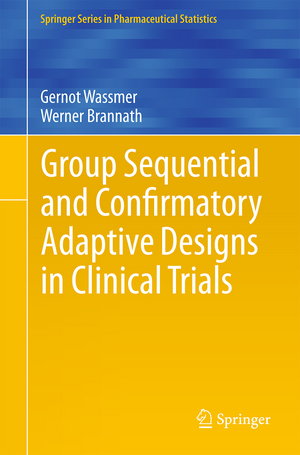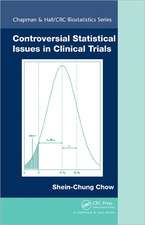Group Sequential and Confirmatory Adaptive Designs in Clinical Trials: Springer Series in Pharmaceutical Statistics
Autor Gernot Wassmer, Werner Brannathen Limba Engleză Hardback – 12 iul 2016
Essentially, this adaptive methodology was introduced in the 1990s. Since then, it has become popular and the object of intense discussion and still represents a rapidly growing field of statistical research. This book describes adaptive design methodology at an elementary level, while also considering designing and planning issues as well as methods for analyzing an adaptively plannedtrial. This includes estimation methods and methods for the determination of an overall p-value. Part I of the book provides the group sequential methods that are necessary for understanding and applying the adaptive design methodology supplied in Parts II and III of the book. The book contains many examples that illustrate use of the methods for practical application.
The book is primarily written for applied statisticians from academia and industry who are interested in confirmatory adaptive designs. It is assumed that readers are familiar with the basic principles of descriptive statistics, parameter estimation and statistical testing. This book will also be suitable for an advanced statistical course for applied statisticians or clinicians with a sound statistical background.
| Toate formatele și edițiile | Preț | Express |
|---|---|---|
| Paperback (1) | 891.17 lei 6-8 săpt. | |
| Springer International Publishing – 31 mai 2018 | 891.17 lei 6-8 săpt. | |
| Hardback (1) | 897.33 lei 6-8 săpt. | |
| Springer International Publishing – 12 iul 2016 | 897.33 lei 6-8 săpt. |
Preț: 897.33 lei
Preț vechi: 1094.30 lei
-18% Nou
Puncte Express: 1346
Preț estimativ în valută:
171.70€ • 179.78$ • 142.42£
171.70€ • 179.78$ • 142.42£
Carte tipărită la comandă
Livrare economică 09-23 aprilie
Preluare comenzi: 021 569.72.76
Specificații
ISBN-13: 9783319325606
ISBN-10: 3319325604
Pagini: 303
Ilustrații: XVI, 301 p. 44 illus.
Dimensiuni: 155 x 235 x 19 mm
Greutate: 0.63 kg
Ediția:1st ed. 2016
Editura: Springer International Publishing
Colecția Springer
Seria Springer Series in Pharmaceutical Statistics
Locul publicării:Cham, Switzerland
ISBN-10: 3319325604
Pagini: 303
Ilustrații: XVI, 301 p. 44 illus.
Dimensiuni: 155 x 235 x 19 mm
Greutate: 0.63 kg
Ediția:1st ed. 2016
Editura: Springer International Publishing
Colecția Springer
Seria Springer Series in Pharmaceutical Statistics
Locul publicării:Cham, Switzerland
Cuprins
Part I Group Sequential Designs.- Repeated Significance Tests: Procedures with Equally Sized Stages.- Procedures with Unequally Sized Stages.- Confidence Intervals, p -Values, and Point Estimation.- Applications.- Part II Adaptive Confirmatory Designs with a Single Hypothesis: Adaptive Group Sequential Tests.- Decision Tools for Adaptive Designs.- Estimation and p-Values for Two-stage Adaptive Designs.- Adaptive Designs with Survival Data.- Part III Adaptive Designs with Multiple Hypotheses: Multiple Testing in Adaptive Designs.- Applications and Case Studies.- Appendix - Software for Adaptive Designs.- Index.
Recenzii
“This is an up-to-date review of the general principles of, and techniques for, confirmatory adaptive designs. … Chapters are well illustrated with tables and figures for better understanding. … This is a valuable resource for clinicians and applied statisticians with a sound statistical background who are interested in confirmatory adaptive designs.” (Pooja Sethi, Doody's Book Reviews, October, 2016)
Notă biografică
Gernot Wassmer is an Adjunct Professor of Biostatistics at the Institute of Medical Statistics, University of Cologne, Germany. He received his PhD from the University of Munich, Germany in 1993, after which he was a Research Fellow at Munich’s Institute of Medical Statistics, at the Institute for Epidemiology, GSF Neuherberg, and at the Institute of Medical Statistics, University of Cologne. His major research interest is in the field of statistical procedures for group sequential and adaptive plans in clinical trials. He has been a member of independent data monitoring committees for international, multi-center trials in various therapeutic fields and also serves as a consultant for the pharmaceutical industry.
Werner Brannath is a Professor of Biostatistics at the Faculty of Mathematics and Informatics, University of Bremen, where he is also head of the biometry group at the Competence Center for Clinical Trials. He has extensiveexperience in the planning and analysis of clinical trials and has been a member of several independent data monitoring committees. His main research interests include adaptive and group sequential designs, as well as multiple testing.
Werner Brannath is a Professor of Biostatistics at the Faculty of Mathematics and Informatics, University of Bremen, where he is also head of the biometry group at the Competence Center for Clinical Trials. He has extensiveexperience in the planning and analysis of clinical trials and has been a member of several independent data monitoring committees. His main research interests include adaptive and group sequential designs, as well as multiple testing.
Textul de pe ultima copertă
This book provides an up-to-date review of the general principles of and techniques for confirmatory adaptive designs. Confirmatory adaptive designs are a generalization of group sequential designs. With these designs, interim analyses are performed in order to stop the trial prematurely under control of the Type I error rate. In adaptive designs, it is also permissible to perform a data-driven change of relevant aspects of the study design at interim stages. This includes, for example, a sample-size reassessment, a treatment-arm selection or a selection of a pre-specified sub-population.
Essentially, this adaptive methodology was introduced in the 1990s. Since then, it has become popular and the object of intense discussion and still represents a rapidly growing field of statistical research. This book describes adaptive design methodology at an elementary level, while also considering designing and planning issues as well as methods for analyzing an adaptively plannedtrial. This includes estimation methods and methods for the determination of an overall p-value. Part I of the book provides the group sequential methods that are necessary for understanding and applying the adaptive design methodology supplied in Parts II and III of the book. The book contains many examples that illustrate use of the methods for practical application.
The book is primarily written for applied statisticians from academia and industry who are interested in confirmatory adaptive designs. It is assumed that readers are familiar with the basic principles of descriptive statistics, parameter estimation and statistical testing. This book will also be suitable for an advanced statistical course for applied statisticians or clinicians with a sound statistical background.
Essentially, this adaptive methodology was introduced in the 1990s. Since then, it has become popular and the object of intense discussion and still represents a rapidly growing field of statistical research. This book describes adaptive design methodology at an elementary level, while also considering designing and planning issues as well as methods for analyzing an adaptively plannedtrial. This includes estimation methods and methods for the determination of an overall p-value. Part I of the book provides the group sequential methods that are necessary for understanding and applying the adaptive design methodology supplied in Parts II and III of the book. The book contains many examples that illustrate use of the methods for practical application.
The book is primarily written for applied statisticians from academia and industry who are interested in confirmatory adaptive designs. It is assumed that readers are familiar with the basic principles of descriptive statistics, parameter estimation and statistical testing. This book will also be suitable for an advanced statistical course for applied statisticians or clinicians with a sound statistical background.
Caracteristici
Provides up-to-date ?overview of group sequential and confirmatory adaptive designs in clinical trials Supplemented with a discussion of practical applications Describes available software products
















